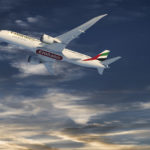
(TAN): The Emirates Group has announced its half-year results for its 2020-21 financial year recording “a half-year loss for the first time in over 30 years,” as said by Sheikh Ahmed bin Saeed Al Maktoum, Chairman and Chief Executive, Emirates Airline and Group.
The group revenue was AED 13.7 billion (USD 3.7 billion) for the first six months of 2020-21, down 74% from AED 53.3 billion (USD 14.5 billion) during the same period last year. This dramatic revenue decline was due to the COVID-19 pandemic which brought global air passenger travel to a halt for many weeks as countries closed their borders and imposed travel restrictions.
[ALSO READ: Lufthansa, SWISS, Austrian Airlines expand Covid-19 cover]
As part of pandemic containment measures, Emirates and dnata’s hub in Dubai also suspended scheduled passenger flights for 8 weeks during April and May. The Group reported a 2020-21 half-year net loss of AED 14.1 billion (USD 3.8 billion).
For Emirates Airlines the overall capacity during the first six months of the year declined by 67% to 9.8 billion Available Tonne Kilometres (ATKM) due to a substantially reduced flight programme over the past months, including the suspension of passenger flights at Dubai international airport for 8 weeks. Capacity measured in Available Seat Kilometres (ASKM), shrunk by 91%, whilst passenger traffic carried measured in Revenue Passenger Kilometres (RPKM) was down by 96% with average Passenger Seat Factor falling to 38.6%, compared with last year’s pre-pandemic figure of 81.1%.
Emirates’ operating costs reduced by 52% against the overall capacity decrease of 67%. Fuel costs were 83% lower compared to the same period last year. Despite the significant drop in operations during the six months, Emirates’ EBITDA stood positive at AED 290 million (USD 79 million) compared to AED 13.2 billion (USD 3.6 billion) for the same period last year.
[ALSO READ: VisitScotland’s virtual event to highlight growth of adventure travel during pandemic]
During the first six months of 2020-21, Emirates retired three older aircraft from its fleet as part of its long-standing strategy to improve overall efficiency, minimise its emissions footprint, and provide high quality customer experiences. The airline also enhanced its customer commitment by expediting refunds, offering rebooking flexibility, setting up a Covid-19 travel information hub on its website to offer the latest updates on ever-changing travel requirements, and by launching the industry’s first Covid-19 medical cover for all passengers at no additional cost.




